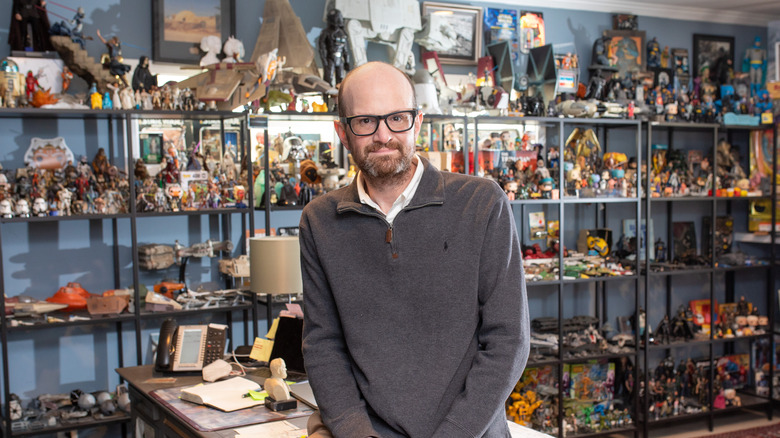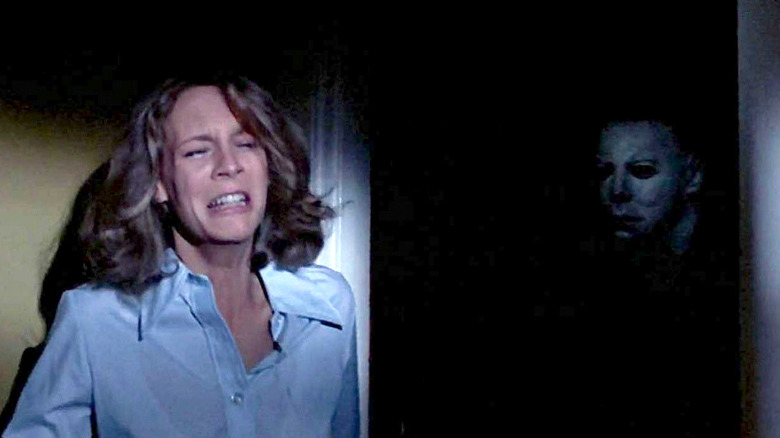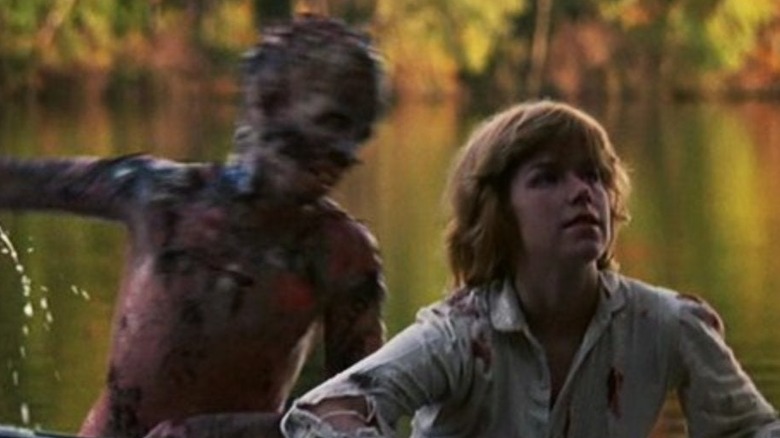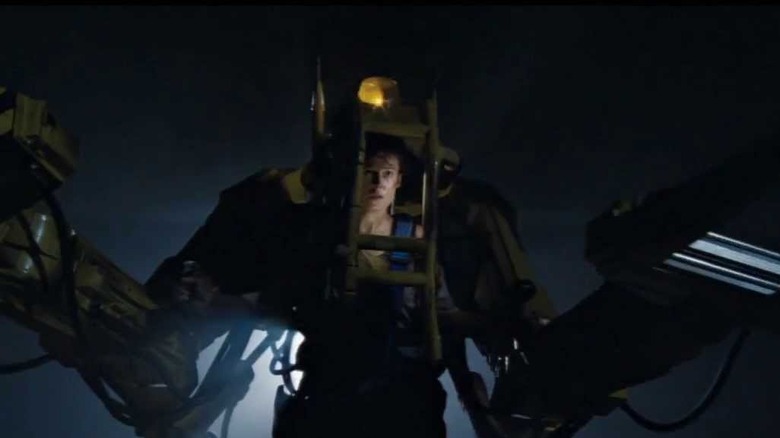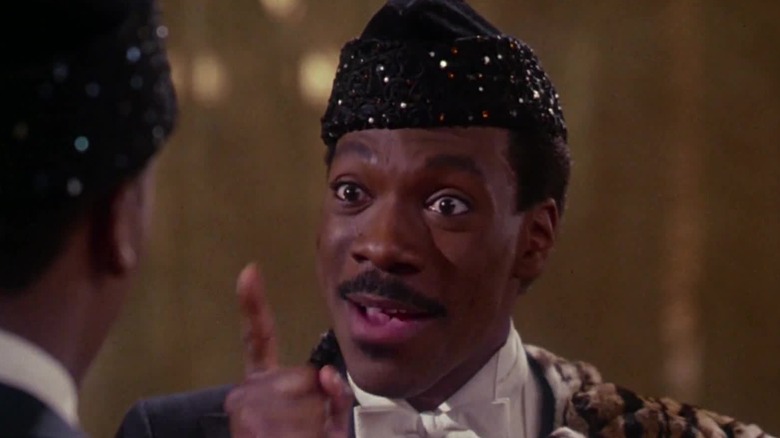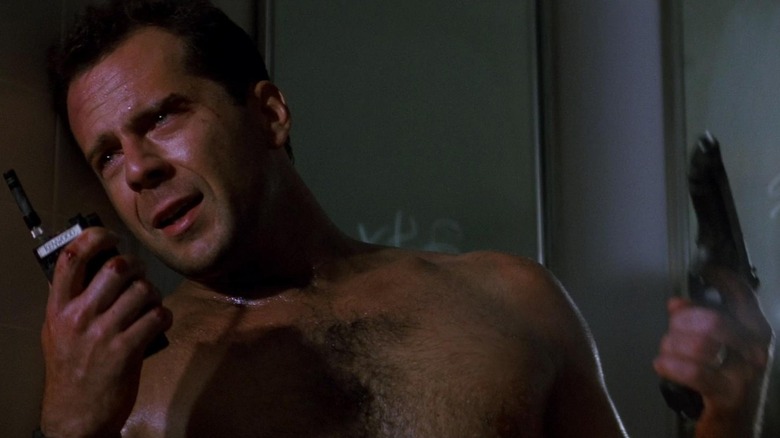The Movies That Made Us Creator Brian Volk-Weiss On Learning To Love Horror [Interview]
"The Movies That Made Us" has a new third season now available on Netflix, releasing episodes on quite a few horror classics just in time for Halloween. As always, the mini-doc series promises to bring together the cast and crew behind your favorites to look at the origins, unknown tales, and interesting stories behind a number of beloved films of this spookiest of holiday seasons. Season 3 includes episodes on the infamous trilogy of slasher classics, John Carpenter's "Halloween," Sean S. Cunningham's "Friday the 13th," and Wes Craven's "A Nightmare on Elm Street" alongside additional episodes on James Cameron's "Aliens," "Robocop," "Coming to America" and more.
I sat down with Brian Volk-Weiss, the creator of "The Movies That Made Us" and its companion series "The Toys That Made Us," both for Netflix. We chatted about the series, surprising and little known tidbits that arose in his interviews and research, favorite slashers, and the personal favorite episodes he'd love to shoot that haven't made it in quite yet.
"Context... is one of my favorite words in the English language."
This season branches off into a healthy dose of horror. Why horror for these episodes?
So horror, it's really interesting. I've always respected horror. I have so many friends who love it as a genre but I never really got it... I'm a science fiction guy, you know? [...] I'm a history guy, I'm a drama guy. For the first time with "The Movies That Made Us" ... and I'm not trying to claim that I was an expert in "Dirty Dancing" beforehand but I'll be honest with you, I was exponentially more familiar with "Dirty Dancing" than I was "Halloween" and "Friday the 13th" in particular. So I really was learning while making the show, and I came out of it with a ... 'I get it, now I get it.' I was at the premiere of "Halloween Kills" last night, and I'm watching it... And I was at the L.A. premiere of the last David Gordon Green "Halloween" and it was apples and oranges because now when I watch the movie, I understand (for lack of a better word) the history that led to that movie. Does that make any sense?
Definitely. I feel like that's why some fans are so into horror history, the context really, really matters.
Context is everything... one of my favorite words in the English language.
I know you just saw Halloween Kills, but are there any other horror films that you've seen since recording these episodes that you really got into?
Well, it's funny... I had to do a lot of research for the show, I always do the research, but [...] because horror had never been my favorite genre, during the research phase [...] I kind of saw everything. I probably did a lifetime's worth of horror movies, it was crazy. But yeah, "Black Christmas" ... I really hope we get to do an episode on "Black Christmas." Have you seen that?
I have. I love "Black Christmas."
I really wish we could have done "Black Christmas." So good. [... And] everybody makes fun of this movie, but "Chopping Mall." That's my new favorite movie. [...] I've got a "Chopping Mall" T-shirt now, a "Chopping Mall" VHS. I had never seen movies like that before. It's funny. Thanks to "The Movies That Made Us" I've actually become ... I hope he is not offended by me using this word, but I've actually become friends with Ed Neumeier, the writer of "Robocop," and his wife edited "Chopping Mall." So [ ... ] I'll get a text and I'll feel my phone vibrate, I'll look at my phone, I'll see Ed Neumeier's name. I still can't believe that, because I'm the biggest "Robocop" fan you'll ever meet. But the extra bonus is getting some gossip on the making of "Chopping Mall."
"Halloween," "Friday the 13th," "A Nightmare On Elm Street," all classics. How did you land on those films?
I've learned the hard way, especially when you're starting something, you don't start with the obscure. You don't start with the back alley. If we're going to do horror movies, we're doing the classics. So it really was that simple. So it's like, if we're doing the classics, what are the classics? And then we really had to decide between, well, are we doing "The Exorcist" and "Rosemary's Baby" or are we doing something slightly more modern?
The decision that I made, which, who knows if it was the right one or not? But what I decided was I really feel like "Rosemary's Baby" and "The Exorcist" ... I really feel that those were still made when the industry considered those films dramas. Horror had not become its own genre yet. I really think the beginning of there being a genre called horror, I really think that starts with "Halloween." So "Halloween" directly led to "Friday the 13th." And both of those films directly led to "A Nightmare On Elm Street."
"They had a lot of heart."
There are a number of interesting factoids in each episode, like the rejection that "The Babysitter Murders" was ever a title. Do you have a favorite tidbit that came out in the process of making these episodes?
I think my favorite thing was [that] I had a lifetime riddle solved. My entire life, even though I wasn't a big fan of "Halloween," everyone was like "Oh, it's a William Shatner mask. It's a Captain Kirk Mask." And I'm always like, "That doesn't look anything like Captain Kirk." My whole life I'm like "What is this?" Learning that they did edit the mask quite a bit and do some work on it, they didn't just turn it upside down and spray paint it, for me was like, "Okay, cool. Well, that makes sense." How come nobody ever talks about that? The thing that I loved especially about ... I mean, all three of them have it, but especially "Friday the 13th" [is that] these were kids. The crew were kids, the cast were kids. They were just goofing around [...] almost everybody we interviewed for "Friday the 13th," everybody was like "I did it for practice," or "I did it. Why not? I had nothing to do that week. Nobody's going to see this." Everybody told us that nobody's going to see this. So that was something I really loved.
"Nobody is going to see this" came up a lot during "Friday the 13th!"
Exactly. But the other thing I also love, like with "Halloween," there are so many flubs, but ... like when he smashes the window and you can see the metal bar, all that stuff. That doesn't matter. The fans don't care. And that's what I find extremely interesting and very cool about the genre, where they just got it right. The other thing I learned, which I thought was interesting, is even [with] "Halloween" people think, "Oh, 'Halloween' came out and changed everything," which is true. But [ ... ] I think "Halloween" blew up [not] because it was first, but ... And I know this is a weird thing to say about these horror movies, but I really think these films pop for two reasons that made them special.
One was they actually ... again, I know this is crazy to say about these films, but I believe it ... they had a lot of heart, they really did. Yes, it's a dumb slasher film. Yes, it's very simple concept, but they had heart. You could tell they were made by people that care about what they were doing. And I don't think that's true for a lot of other horror films of that era, so that's the first thing. And then the second thing is they were really well cast. Again, if you look at some of the other movies that came out at the same time, the casts aren't great. The acting ... Again, I know it's not "Amadeus." It's not "Gladiator." I get it. But my point is, compared to a lot of other movies in the genre, these three films [...] had really good casts, and I don't just mean good acting. They had charisma. These were actors with charisma. And that's what makes a movie work. That's what makes a movie stand out.
It's so interesting too. I mean, you look at the people that got started in these roles, like Johnny Depp and Kevin Bacon. They're people that became some of the most charismatic and recognized actors of all time, starring in cheap movies like "Friday the 13th."
Exactly. And by the way, again, with very few exceptions, you're not going to find other horror movies with a comparable quote-unquote graduating class. It really shows you how impressive the casting was.
"Usually at the end of the movie it's the woman who saves the day."
Were there any moments for digging into these films that, that made you stop and think, "Well, they couldn't do that today"?
Oh, my God. Yeah. Oh, let's start with, I don't know, chopping a snake in half, a real snake. [...] I guarantee you ... Well, anyway. I won't go there. But yes, definitely. You're not going to cut a snake [...] I'll tell you another thing I thought was interesting is ... again, having not been a huge horror fan in my whole life, I think there's a real misconception with these movies that the female protagonists are victims.
I thought it was extremely interesting that a genre that has a reputation for all these women being chased around and needing the men to save them and all that stuff, which by the way was true in almost every other genre of that era... [ in ] horror, almost every one of these movies [ ... ] usually at the end of the movie it's the woman who saves the day. Point other movies to me in the late '70s, early '80s, where that's the case.
At least three of the films from this season have not even just survivor female protagonists, but you're looking at Jamie Lee Curtis, you're looking at Sigourney Weaver, you're looking at Heather Langenkamp. They're literal bad-asses. They're incredibly strong characters.
Exactly. And none of those characters were trained to be bad-asses, they just rose to the occasion. That's what all four films, if you're going to include "Aliens," that's what all four films have in common. And by the way, I'll put Nancy Allen in "Robocop" on that list too.
"Robocop" is such a classic, and I know it means something to you. What's something surprising you learned digging into that film for this season?
Well, "Robocop" was the opposite of the horror films. I hate using this word, but I think I can safely describe myself as a expert on "Robocop." I've conservatively seen it 300 times, and I have an entire shelf in my collection dedicated to "Robocop." There were very few surprises. [ ...]
I mean, one of the surprises was [ ... ] it really was another film where, to use a cliche, it was 'lightning in a bottle.' [ ... ] I knew there was a lot of problems with the suit. I knew Peter Weller wasn't getting along great with everybody, but I didn't realize they fired him. I mean, he absolutely was on the path to being sent home. I never realized how bad it got and how Peter basically had to turn [around] and immediately behave, otherwise he would've been kicked off the movie. We have it in the episode. They were literally asking a stunt man who had no acting experience, but could fit in the costume, if he'd be willing to play Robocop if they fired Peter Weller. I did not know it got that close.
"Here's the star of the movie getting into a fistfight with his director."
Are there any other stories that you think are particularly interesting to pull out from this season?
Oh, my God. I mean, where to start? One of the things we did that I have always wanted to do [ ... but ] finally was able to do it in the "Coming to America" episode, we did this Rashomon thing. [ ...] I actually knew this before the episode was greenlit because I did Arsenio Hall's Netflix special and he had told me this story after, so I had known for a little while [...] Eddie Murphy had literally gotten into a fist fight with John Landis while making the movie.
What was interesting, and this is what I'd always wanted to do but I'd never been able to do until now, is we did this whole little [piece] where literally ... I think we asked six or seven people what caused the fight, and we got six or seven different answers. And we put them all in the episode. I have my theory as to which one is correct, but the fact that ... here's the star of the movie, one of the most famous people on earth, getting into a fistfight with his director in front of 100 people, that's pretty wild. And we were able to get at least six or seven of those people to tell us what happened. And then you hear completely different stories. It says a lot about the human condition.
"Every time a movie's made, it's really about luck."
These stories from behind-the-scenes are so illuminating.
Well, one of the things I've learned from now making, I think, 16 episodes of this show is ... Oh, my God. Every time a movie's made, it really is about luck. You can do all the preparation you want, you can have the most talented people, but [ ... ] there are so many separate things that have to line up for a movie to work.
The other thing, which I always find so interesting about a lot of the movies we've covered ... Fox had no idea what "Home Alone" was. Warner Brothers let it go. A lot of these movies have in common [that] they almost get green-lit by accident. So many of the films we covered were green-lit because "they needed a movie in August," of the following year, other deals they were trying to do fell apart. So they're like, '"All right, we'll make 'Die Hard.'" When "Die Hard" was in production, "Midnight Run" was also in production and everybody at Fox was talking about "Midnight Run." Nobody was talking about "Die Hard." So that's one of the things if you watch every episode, you'll see all these people being like, "Oh, look at that line in front of the movie theater. I wonder what movie that is... Oh, my God, it's my movie." Almost all these were ... Half of them weren't even sleeper hits. They were massive hits out of nowhere...
One final, very difficult question. Personally, between Michael Myers, Jason and Freddy, who's your favorite on a personal level?
I mean, no offense to Jason and Mr. Myers, but first of all, they don't talk. Let's start with that. Second of all, they're kind of simple. Michael Myers just kind of walks around and for the most part, just smashes people against walls. Freddy, extremely funny. He does talk and is very creative. Of those three movies, I really respected "Halloween" and "Friday the 13th," but I enjoyed "A Nightmare On Elm Street." So that also definitely ties into my answer.
